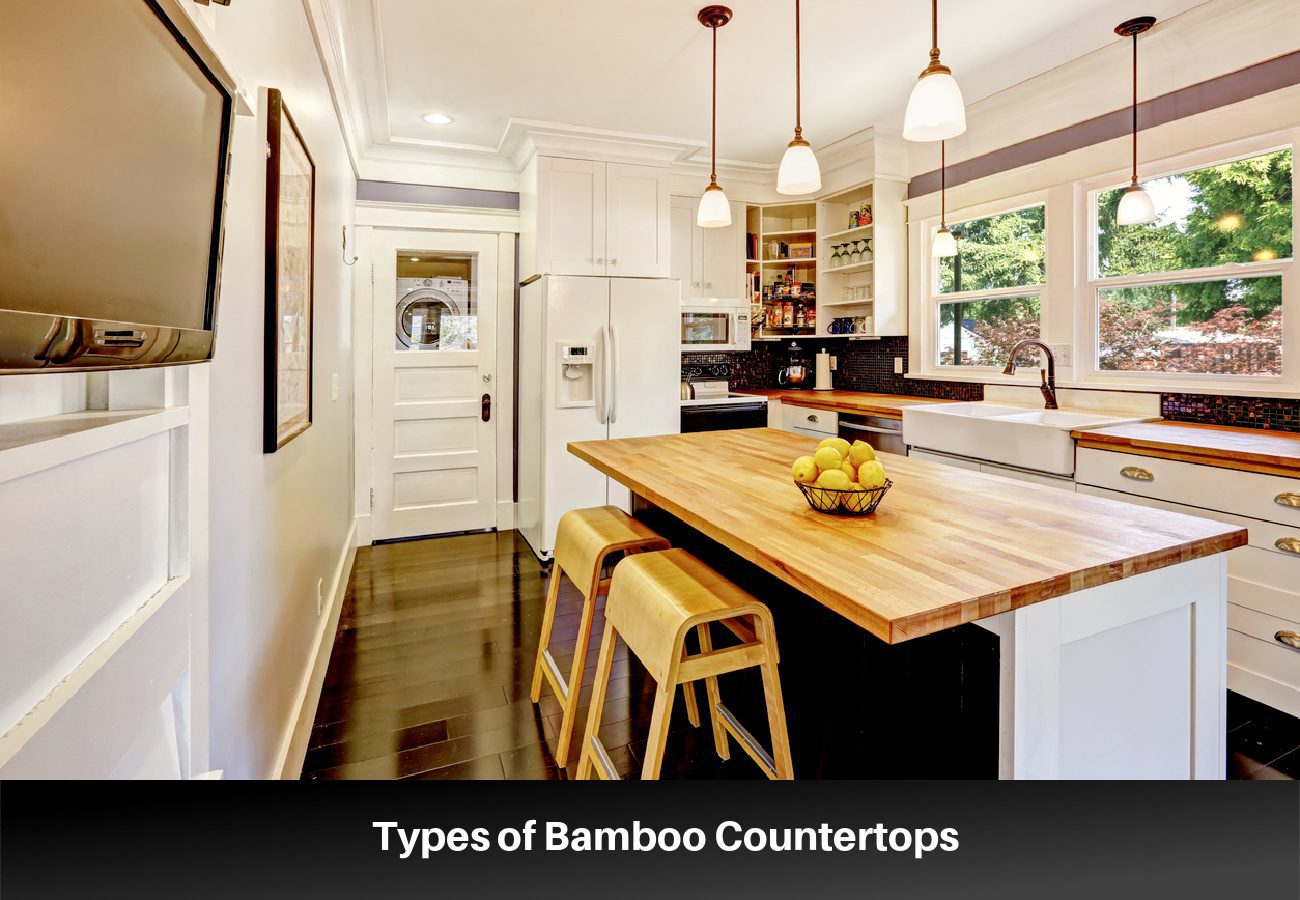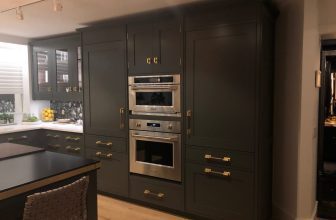
[ad_1]
Bamboo countertops are increasingly popular with homeowners as an alternative to traditional materials because of their durability, sustainability, and warmth. Countertops made from treelike grass bamboo offer a similar look and texture to wood countertops but are harder and longer lasting.

Unlike marble and granite countertops, bamboo offers stunning beauty at a fraction of the cost. Bamboo is also a fast-growing material, so you can feel good about using this renewable resource as part of your eco-friendly kitchen design.
Types of Bamboo Countertops
There are four main types of bamboo countertops that present different surface appearances: vertical grain, end grain, flat grain, and strand woven.
- Vertical Grain – Vertical grain bamboo countertops are the most common style for bamboo countertops. Manufacturers create this style when they join together strips of bamboo to create a vertical pattern. You can recognize this style because of the striped pattern and the vertical orientation of the lines.
- End Grain – End grain bamboo countertops are also known as parquet butcher block and can feature the same pattern. Manufacturers make these countertops by gluing short blocks of bamboo together in distinct patterns. Because of the tight grain and pattern of this type of countertop, it is the best bamboo surface for resisting scratches.
- Flat Grain – Flat grain countertops are also called face grain because they are created by opening the bamboo and joining the pieces face-up.
- Strand Woven – Strand woven countertops do not have the stark lines that grain countertops do. Instead, manufacturers create these countertops by weaving strands together with adhesive and then pressing them under high pressure. Strand woven bamboo countertops have an appearance that is more similar to solid wood.
Construction of Bamboo Countertops
All bamboo countertops require adhesive and pressure to bind the pieces together as there is no piece of bamboo large enough to create a truly solid surface. That said, there are solid bamboo countertops and plywood bamboo countertops and they differ in the raw materials used to create the end product. Both of these construction methods produce countertops that are durable, hard, and suitable for kitchen use.
- Solid Bamboo Countertops – Solid bamboo countertops come in different thicknesses and internal structures. Manufacturers create them by gluing solid bamboo pieces together in various patterns.
- Plywood Bamboo Countertops – Fabricators make plywood bamboo countertops by gluing sheets of bamboo together under high pressure. After fabricators create the boards or panels, they can cut them apart to display different grain patterns.
Cost of Bamboo Countertops
Bamboo countertops cost between $25-$100 per square foot for just the materials. For a 50-square-foot section, expect to pay between $2,000-$3,000 on average for the countertops. Labor costs tend to run between $5-$15 per square foot. The price will be more or less depending on the type of bamboo used in creating the countertop as well as the quality and durability of the adhesives.
The most expensive type of bamboo countertops is created from Moso bamboo, which is well known for its strength and durability. Adhesives that don’t use formaldehyde and are environmentally friendly increase the price but are better for creating a healthy kitchen environment. You can save money on your bamboo countertops by comparing prices between manufacturers, waiting for sales, purchasing a less expensive style and finish known as builder’s grade, and installing the bamboo countertops yourself.
Everyday Care for Bamboo Countertops
The everyday care of bamboo countertops is straightforward and simple but should be maintained if you want to preserve the quality of your bamboo countertops.
- Clean Spills Promptly – Like wood countertops, bamboo can stain if left exposed to standing water. Clean up liquid spills as they occur.
- Avoid Abrasive Products – Use a soft cloth or sponge and warm water or mild soap to clean the surface as needed. Do not use abrasive cleaners or pads, as these can scratch the surface.
- Use Cutting Boards – Rather than cut directly on the surface of your bamboo countertops, use cutting boards to prepare food. This will prevent scratches and dents from marring the surface.
- Use Trivets and Hot Pads – Bamboo countertops cannot withstand heat and can burn if exposed to hot surfaces. Use trivets for hot pans and pots to avoid marking the surface.
Long-Term Maintenance for Bamboo Countertops
You should expect some long-term care of bamboo countertops to keep them looking gorgeous.
- Avoid Damage – Practice proactive maintenance of your countertops and avoid actions that will create damage. Use cutting boards for food prep. Do not leave any standing water or other liquid on the countertop, which creates stains. Do not use abrasive cleaners or scouring pads, which destroy the finish on the countertops. Also, do not place hot pots and pans directly on the surface of the bamboo without a trivet or hot plate. Doing this can create burn marks that need to be removed with sanding.
- Oil the Surface Regularly – It is vital that you apply a coat of oil to your bamboo countertops every couple of months in order to avoid a dry and brittle surface. Use a food-safe oil like linseed, tung, or mineral oil. Apply the oil with a soft cloth. Allow the oil to penetrate the surface before wiping off the excess with a clean cloth.
- Consider a Sealer – Some people use linseed, tung, or mineral oil to seal the surface of their bamboo countertops. Others prefer a more long-lasting option like polyurethane or varnish. A long-term sealant is not a necessary step and should be considered in light of family allergens and food exposure preferences.
- Sand Out Scratches – When scratches or dents occur, you need to sand them out with fine-grit sandpaper. Use sandpaper that has a grit of 120-180. Carefully sand in the direction of the grain until you have removed the mark and the surface is smooth again. Use a higher grain to finish if you want the surface smoother.
- Address Damage Quickly – Always address any problems with your countertops quickly as leaving them can create larger problems as time passes.
Pros and Cons of Bamboo Countertops
Bamboo countertops have distinct qualities that create unique positives and negatives that you should consider before an initial investment.
Pros:
- Eco-Friendly – Bamboo is a renewable resource because it is a fast-growing resource that can be harvested without harming the environment. The bamboo plant requires very little water to grow and can thrive without pesticides and fertilizers making it a more eco-friendly countertop than other wood options.
- Affordability – Bamboo countertops are less expensive than natural stone countertops like granite and marble. Compared to wood countertops, they are similar to many mid-range choices but less than high-priced woods like teak and exotic woods like zebrawood.
- Easy Care – Bamboo countertops are easy to clean and maintain, as you can wipe them down with a soft cloth and water. They naturally resist the growth of bacteria and mold.
- Appearance – Bamboo has the same warmth and textured look as wood countertops. You can vary the look of bamboo countertops according to the style of the surface.
- Durability – Bamboo is a hard and durable material. It has an excellent strength-to-weight ratio making bamboo kitchen countertops an ideal surface for countertops.
Cons:
- Prone to Scratches – Even though bamboo is durable, it is prone to scratches from knives, pots, and pans. It is important to note that you can easily sand out the scratches when needed.
- Regular Maintenance – The maintenance of bamboo is easy but it does need to be constantly maintained in order for the countertops to look their best. This includes regular cleaning and oiling of the surface.
- Water Resistance – Bamboo countertops are not water resistant. You must clean up spills from water and other liquids quickly and not allow them to sit as they can cause staining.
- Heat Resistance – Bamboo kitchen countertops cannot withstand heat and can burn if exposed to scalding surfaces.
- Limited Color and Designs – Bamboo is available in just one color, though in a variety of configurations. It is possible to change the color of the bamboo countertop with either stain or dark oils, but one must apply the stain carefully as bamboo takes stain differently than many softwoods.
[ad_2]
Source link





